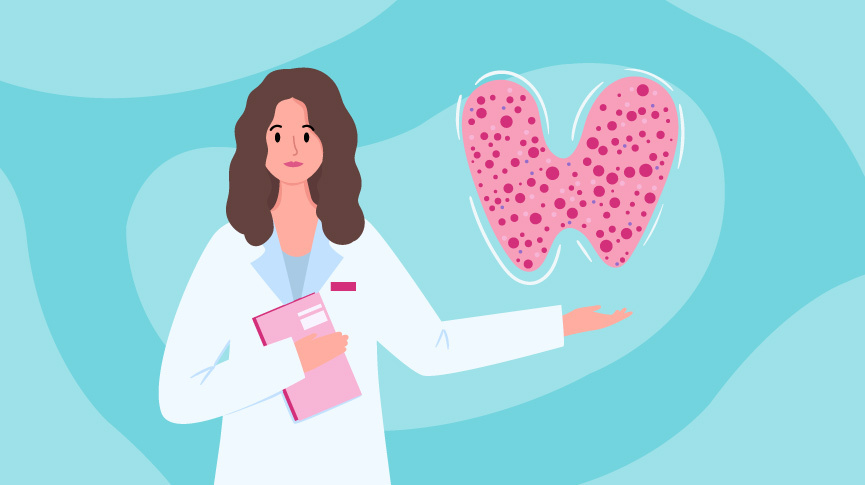What’s a Thyroid Disorder?

This article was medically fact-checked by Consultant Obstetrician and Gynaecologist Dr. Shree Datta.
There’s a lot of talk these days about thyroid conditions. You may have heard stories of people finally getting answers to long-term questions about their health, once they started to examine their thyroid.
It’s especially important for women or people who were assigned female at birth to be aware of thyroid disorders, as they are five to eight times more likely to develop one. About one in eight women will develop a thyroid condition in their lifetime.
So what exactly is the thyroid and what disorders and conditions can affect it?
What Is The Thyroid?
The thyroid is an integral part of the endocrine system. This small butterfly shaped gland lies in the lower portion of the front of your neck.
This incredible gland is best known for its role in hormone secretion, but it also helps in vocalization and voice quality. Hormones secreted by the thyroid help control and regulate metabolism, heart rate, brain development during adolescence and infancy, growth, and body temperature.
It does this by extracting iodine from the food you eat and turning it into the two main thyroid hormones, T3 (Triiodothyronine) and T4 (Thyroxine). These hormones impact almost every cell in your body.
This gland has a whole lot of responsibilities, and is an integral part to your health and wellbeing. As you can imagine, when the thyroid is impaired it can seriously impact the body.
Types of Thyroid Disorders
Because the thyroid has many different roles, there are a number of different ways thyroid disorders can affect the body.
Hyperthyroidism: This is when there is an excessive amount of thyroid hormone production. Symptoms may include irritability and nervousness, fatigue and trouble sleeping, excessive thirst and needing to pee often, weight loss despite increased appetite, low libido, muscle weakness, and diarrhea. It is often a result of Graves’ Disease or an overactive nodule on the thyroid.
Hypothyroidism: This is the most common thyroid disorder, and is marked by low production of thyroid hormones. Hypothyroidism is most commonly caused by autoimmune disorders. Symptoms of hypothyroidism include irregular periods, constipation, depression and tiredness, muscle cramps, slow thoughts and movements, carpal tunnel syndrome, weight gain, and cold sensitivity.
Thyroid Cancer: This is typically curable and not very common. Luckily, the five year survival rate is about 95%. People with thyroid cancer often have no symptoms, and are only diagnosed when their provider does a general physical exam or they have imaging done for an unrelated reason. If they do have symptoms, they may include difficulty swallowing and breathing, hoarseness, throat or neck pain, a persistent cough, and/or a lump in the front of the neck.
Hashimoto’s Disease: Is caused when the immune system attacks the thyroid, resulting in hypothyroidism. Hashimoto’s disease affects about 5 out of 100 people in the United States. It most often occurs in people who are forty to sixty years old. People may have the same symptoms listed above in hypothyroidism, as well as an enlarged thyroid that can be visible. People with autoimmune disorders like celiac disease, type 1 diabetes, or lupus may be more likely to develop Hashimoto’s.
Goiter: Or thyroid swelling, is more of a symptom of thyroid disorders like Hashimoto’s disease, than a separate disorder. Sometimes it’s totally harmless, but it can also be indicative of an iodine deficiency.
Some other thyroid disorders include relatively common and typically harmless thyroid nodules, and a rare form of hyperthyroidism called a thyroid storm which can cause serious issues.
The Thyroid and Reproductive Health
Thyroid disorders can greatly impact people’s reproductive health. This could look like excessively heavy or missed and light periods. They can also affect fertility, and be a contributing factor in repeated miscarriages.
If you have experienced recurrent pregnancy loss or difficulties conceiving, it can be helpful to get your thyroid checked out, especially before pursuing fertility treatments.
Treating Thyroid Disorders
Since thyroid disorders can vary greatly, so do treatment protocols. Even for people with the same condition, treatment their treatment needs can vary.
Treatment for thyroid conditions may include:
- Radiation if cancer is present.
- Removal of part or all of the thyroid in the case of cancer or hyperthyroidism.
- Radioactive iodine which is used to destroy cancerous tissue or an overactive gland.
- Antithyroid medications that slow down the production of hormones for people with hyperthyroidism.
- Thyroid pills which are used as hormone replacement therapy for people with hypothyroidism.
- Natural remedies and lifestyle changes like decreasing stress levels, eating a healthy diet, and balancing missing nutrients like B vitamins and selenium (important for thyroid function and metabolism).
Risk Factors for Thyroid Disorders
There are certain risk factors that make people more susceptible to thyroid disorders.
Like we mentioned before, women and people assigned female at birth have a much higher risk of developing a thyroid condition, as well as people with preexisting autoimmune disorders
There is likely a genetic component to many of these conditions, so if someone in your family has or had a thyroid disorder, this can give you some insight into your own health.
If you suspect you may have a thyroid disorder, advocate for yourself, and be sure to get your thyroid levels tested along with a comprehensive screening.
Facts Checked By:

Dr. Shree Datta is a Consultant Obstetrician and Gynaecologist in London, specialising in women’s health including all menstrual problems such as fibroids and endometriosis. Dr. Shree is a keen advocate for patient choice, having written numerous articles and books to promote patient and clinician information. Her vision resonates with INTIMINA, with the common goals of demystifying periods and delivering the best possible care to her patients.
Article written by:

Natasha (she/her) is a full-spectrum doula and health+wellness copywriter. Her work focuses on deconstructing the shame, stigma, and barriers people carry around birth, sex, health, and beyond, to help people navigate through their lives with more education and empowerment. You can connect with Natasha on IG @natasha.s.weiss.



I have for few weeks now had difficulty swallowing feeling like something in throat
Hi Michael,
do not wonder, please visit your doctor if you think you have problems with your Thyroid.
Good luck